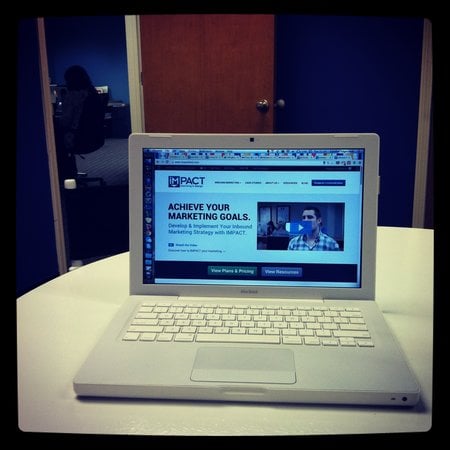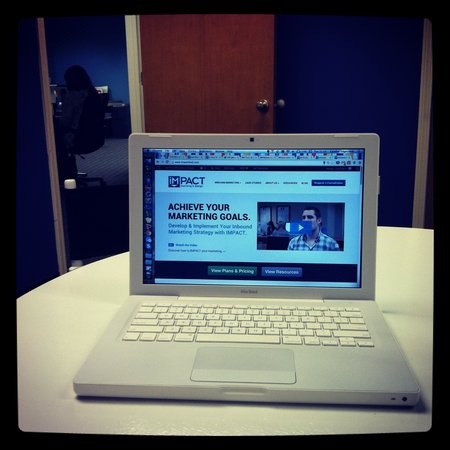Topics:
Web DesignJoin 40,000+ sales and marketing pros who receive our weekly newsletter.
Get the most relevant, actionable digital sales and marketing insights you need to make smarter decisions faster... all in under five minutes.
 When you think of a business asset, your website might not be the first thing that comes to mind.
When you think of a business asset, your website might not be the first thing that comes to mind.
As a CEO or business owner you might consider your assets to include customers, business reputation, office building, any equipment, your employees, brand name and logo, as well as any trademarks or patents.
Most people rarely name their website an asset to their business.
As more and more prospects and customers are accessing the Internet to educate themselves and learn more about your company and industry, your website should be a part of that list.
Just having an "online brochure" is no longer enough. You need a website that's a valuable asset to your business.
Redefine the 1200 X 800 pixel website; break away from above the fold. You need to think of your website as a "well-oiled machine." It's important to ensure that you've put all of the tools and strategies into place to ensure that your website is your most valuable asset.
Ensuring that you have an SEO strategy and the layout of your website are important but those aren't the only essential elements. It's all about implementing a strategy that can take you to the next level.
Turning Your Website into Your Most Important Asset
Content Strategy to Attract Traffic
Your content should be seen as the heart of your website. Hopefully you aren't just creating content to increase your number of website pages. Even though more pages will increase your SEO ranking, you need to factor in your customers. Those are the people that will be reading your content and helping you expand your reach.
You won't be able to increase your blog or website traffic if your content strategy is non-existent. Your content strategy should revolve around providing value that scales.
The amount of effort you're putting into creating an article should be the same whether 30 or 30,000 people read the article. It's all about knowing who your buyer personas are and creating content that fulfills a need or want. Whether it's a blog article, an ebook, a video, an infographic or a webinar the content within each medium should support an overall need or want that your buyer personas have.
Don't just jump right in. You are not participating in the penguin plunge. There is no need to just hope for the best.
Have you implemented these tactics into your content marketing strategy?
- Buyer personas
- Relevant and educational content
Going back to statement previously made, don't follow in the footsteps of everyone else. Develop content that is unique and different from everything else your competitors are writing about. It's also important to remember that you aren't just writing to write. Develop content to educate your ideal prospects.
Here's a little tip: attracting traffic to your website isn't just about the copy within your content. Everyone has heard the saying, "never judge a book by its cover." Unfortunately, that doesn't always apply to those reading your content. The headline could make or break you.
Having a strategy is key.
Lead Generation Enabled
Landing pages are definitely at the center of your lead generation efforts. How else are you going to convert your website visitors into leads?
You could say blog content and calls-to-action, but neither of those are going to work in generating leads unless they are pointing to a relevant offer on a landing page. Still not to sure about adding landing pages to your site? Companies with 30 or more landing pages actually generate 7 times more leads than those with fewer than 10.
The whole objective of landing pages is to educate and engage with your ideal prospects. Think of landing pages and good content as the gateway to lead generation.
Would you just provide a company with your personal information just for the fun of it? I wouldn't. But then again, you cannot fill out a form if they don't have any landing pages.
Give them the opportunity to convert from a website visitor to a lead. You can create thousands of offers but they won't benefit your company, if they aren't placed on a landing page.
To get your visitors to convert on your landing pages consider implementing these tips:
- Promoting your offers on social.
- Make your landing pages easy to find. Create a resources tab on your navigation bar.
- Only ask for the information you need.
- Keep your visitors on your landing page by removing the navigation bar.
- Landing page content should be written in the second person. Tell them how you will help them.
- Include a link to your privacy policy.
Connected to a CRM
The whole goal of marketing is to build meaningful relationships with prospects and existing customers. But where are you going to keep all of that information about how to contact them, what industry they work in, what offers they've downloaded, what their biggest pain point is, etc?
You don't have all the time in the world to manually input someone's information and behavior on your site in an excel document. If you're a smaller company it might be a time consuming task you give an intern to input. But this can be extremely difficult for a larger company.
That's where a CRM comes in handy. It helps you easily keep track of all the information and each engagement you have with your potential and existing customers.
So, have you connected your marketing software to a CRM? If you haven't you should. There are more benefits than just having the ability to track all lead communication in one place.
Once you're connected to a CRM you can start implementing behavior based marketing; such as SMART CTAs, progressive profiling and lead nurturing to target and engage with your audience. You have the ability to send specific content and offers to your leads based on what pages they've viewed and offers they've downloaded.
Some other benefits include:
- Better alignment between sales and marketing
- Shorter sales cycle
- Closed loop marketing analytics
Measurable
What worked and what didn't? You should be continuously making changes to your website.
If you don't know the answer to that question you might want to consider looking at the performance of your blog, offers, and CTAs to see which ones are getting the most views, conversions and engagement.
According to an article by Social Media Today, 75% of companies don’t update their websites in any way. You won't be able to make any changes if you aren't tracking and monitoring key performance indicators.
To measure your success, monitor these metrics:
- Traffic to lead ratio
- Lead to customer ratio
- Landing page conversion rates
- Inbound links
- Blog views identify which blog posts have the most views. What types of posts are those? What topics are they covering? Also, remember just because an article is from 3 years ago doesn't mean that it will have more views than a current article.)
- Social media reach
You might notice that a blog article about a particular topic is your most viewed article of all time. You might want to consider creating content similar to that article to further engage and educate those individuals.
Free: Assessment

